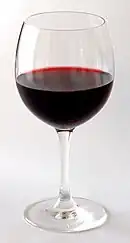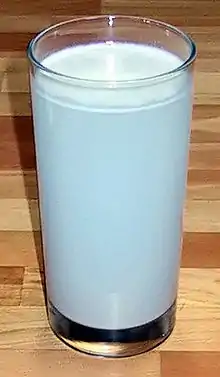Mixture
In chemistry, a mixture is a substance that is made up of two or more simpler substances. These substances can be chemical elements or compounds. A mixture can be made of liquids, solids, or gases.[1]
Characteristics
A mixture is not the same as a compound which is made of two or more atoms connected together.[2] For instance, a mixture of the gases hydrogen and nitrogen contains hydrogen and nitrogen, not the compound ammonia which is made of hydrogen and nitrogen atoms.
A mixture where the different parts can be distinguished easily is called heterogenous, one where this is not the case is called homogeneous. A third form is called colloid.[3]
If one substance in a mixture dissolves in the other, it is called a solution. For example, if sugar is put in water it forms a mixture, then dissolves to make a solution. If it does not dissolve, it would be called a suspension.
Solids can be mixtures also. Alloys are mixtures. Many kinds of soil and rock are mixtures of different minerals. Thus, a mixture is made of two or more elements and/or compounds which are not chemically combined.[4]
Gallery
 Red wine in a glass, a homogeneous mixture.
Red wine in a glass, a homogeneous mixture. Different kinds of peppercorn, a heterogenoeus mixture
Different kinds of peppercorn, a heterogenoeus mixture

References
- Chemistry (IUPAC), The International Union of Pure and Applied. "IUPAC - mixture (M03949)". goldbook.iupac.org. doi:10.1351/goldbook.M03949. Retrieved 2021-05-11.
- Whitten, Kenneth W. (1992). General chemistry. Kenneth D. Gailey, Raymond E. Davis (4th ed.). Fort Worth: Saunders College Pub. ISBN 0-03-072373-6. OCLC 25401134.
- Petrucci, Ralph H. (2002). General chemistry : principles and modern applications. William S. Harwood, F. Geoffrey Herring (8th ed.). Upper Saddle River, N.J.: Prentice Hall. ISBN 0-13-014329-4. OCLC 46872308.
- "Definition of mixture - Chemistry Dictionary". www.chemicool.com. Retrieved 2021-05-11.